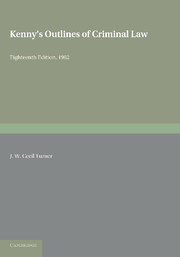Book contents
- Frontmatter
- Preface to the Sixteenth Edition
- Preface to The Seventeenth Edition
- Preface to the Eighteenth Edition
- Contents
- Index of cases
- Index to the principal statutes
- List of principal books cited
- BOOK I GENERAL CONSIDERATIONS
- CHAPTER I CRIME AND CRIMINAL LAW
- CHAPTER II PRINCIPLES OF CRIMINAL LIABILITY
- CHAPTER III VARIATIONS IN LIABILITY
- CHAPTER IV PRELIMINARY CRIMES
- CHAPTER V THE POSSIBLE PARTIES TO A CRIME
- CHAPTER VI THE CLASSIFICATION OF CRIMES
- BOOK II DEFINITIONS OF PARTICULAR CRIMES
- BOOK III MODES OF JUDICIAL PROOF
- BOOK IV CRIMINAL PROCEDURE
- Appendix I The meaning of ‘credit’
- Appendix II II Rules as to admission of evidence which reveals to the jury facts discreditable to the person accused
- Appendix III III Forms of indictment
- Index
CHAPTER V - THE POSSIBLE PARTIES TO A CRIME
from BOOK I - GENERAL CONSIDERATIONS
Published online by Cambridge University Press: 05 June 2016
- Frontmatter
- Preface to the Sixteenth Edition
- Preface to The Seventeenth Edition
- Preface to the Eighteenth Edition
- Contents
- Index of cases
- Index to the principal statutes
- List of principal books cited
- BOOK I GENERAL CONSIDERATIONS
- CHAPTER I CRIME AND CRIMINAL LAW
- CHAPTER II PRINCIPLES OF CRIMINAL LIABILITY
- CHAPTER III VARIATIONS IN LIABILITY
- CHAPTER IV PRELIMINARY CRIMES
- CHAPTER V THE POSSIBLE PARTIES TO A CRIME
- CHAPTER VI THE CLASSIFICATION OF CRIMES
- BOOK II DEFINITIONS OF PARTICULAR CRIMES
- BOOK III MODES OF JUDICIAL PROOF
- BOOK IV CRIMINAL PROCEDURE
- Appendix I The meaning of ‘credit’
- Appendix II II Rules as to admission of evidence which reveals to the jury facts discreditable to the person accused
- Appendix III III Forms of indictment
- Index
Summary
Section I. Introductory
Crimes are often grouped by English lawyers into three classes— treasons, felonies and misdemeanours. In the gravest, and also in the least grave, of these three, no legal distinction, either of substance or even of form, is drawn between the various recognized modes of taking part in the commission of them. For the guilt of even the slightest share in any treason is regarded as being so heinous that it is needless to distinguish it from still deeper shades of guilt. And, on the other hand, no activity in a misdemeanour is considered heinous enough to make it worth while to draw A formal distinction between it and any less prominent mode of taking part in the offence. Hence if a crime belongs to either of these two opposite extremes, all persons who are concerned in it in any way— whether by actually committing it, or only by keeping near in order to assist whilst it is being committed, or merely by suggesting its commission— are indiscriminately classed together by the law as being alike ‘principals’ in the offence.
But in the intermediate group of crimes, viz. felonies, the rules of the common law were more complicated, and formal notice was taken of gradations of participation in them. Thus it was an ancient principle of the common law that no accessory could be convicted or suffer any punishment where the principal offender was not attainted, or had the benefit of his clergy (ante, 55). As the result of this, if the principal fled the country, or died, or had his clergy, or was pardoned, the accessory went free. In the interests of the Crown, however, the courts held that any kind of participation in treason made the participant a principal. Treason, of course, was never clergyable. These old difficulties have now been removed by a series of legislative enactments, but the gradations of guilt which arise from the various ways in which a man may be concerned in a single crime are still distinguished, though their practical importance has now almost entirely disappeared.
- Type
- Chapter
- Information
- Kenny's Outlines of Criminal Law , pp. 103 - 115Publisher: Cambridge University PressPrint publication year: 2013



